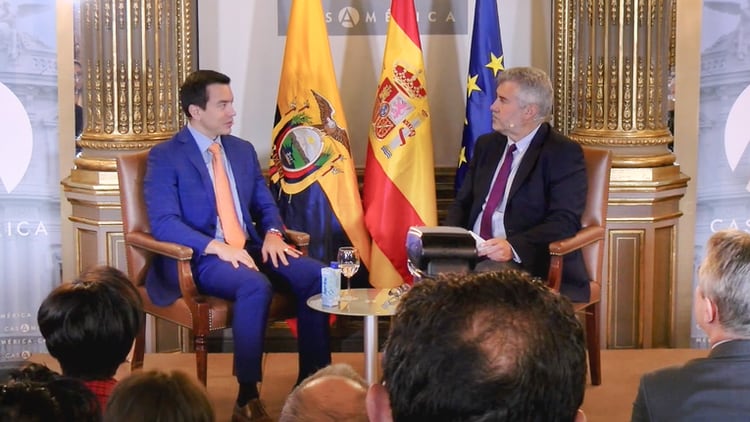The Diplomat
The president of Ecuador, Daniel Noboa, said yesterday during a speech at Casa América that he would settle his differences with Mexico, if this country respects the principle of non-intervention, alluding to the open conflict between the two countries, after the Ecuadorian Police entered on April 5 at the Mexican Embassy in Quito to arrest the former vice president of Ecuador Jorge Glas, who had taken refuge there.
Noboa, who is making a new visit to Spain as part of a tour of several European capitals, analyzed in the Efe Tribune, in a conversation with the president of the agency, Miguel Ángel Oliver, the first six months of his mandate.
The Ecuadorian president said that it has been a “very intense” period and assured that he has managed to “significantly improve” some of the country’s problems.
“In this second stage we must carry out work, we must teach Ecuadorians that the effort and sacrifice they made in the first six months and the effort that the Government made in the fiscal part as well, now they will see the fruits,” he stated.
According to the Ecuadorian president, Mexico contravened international treaties by hosting Jorge Glas in its Embassy in Quito. The assault on the diplomatic representation led Mexico to break relations with Ecuador and go to the International Court of Justice (ICJ) to request precautionary measures against the country, whose government it accuses of violating the Vienna Convention.
Yesterday Noboa stressed that Mexico had as a guest “a person who was serving not one, but two sentences from past governments, not mine, and was at that time a fugitive from Justice.” “We – he said – respect the different powers of the State, and the Judiciary has its independence. If he is convicted, if he is sentenced, we have to abide by that. That is a democratic system and a system that respects international law.”
The Ecuadorian president said that the Vienna Convention also “speaks that there should be no intervention (by countries) in judicial matters.” And he continued: “I give you an example: the person convicted of corruption for harming many Ecuadorians (Glas) was serving a sentence with alternative measures, he was in jail, from jail they sent him to house arrest to appear once a week in court”.
“It’s like if someone is in jail, he escapes from jail and runs into an embassy. We would leave a terrible precedent, if we give in to that, tomorrow another nation can say, look, 100 people escaped from prison and got into our embassy, put them on a plane, take them to another country. “We can’t do that,” he indicated.
Noboa ventured on what happened: “I think it will be a historic turning point in how embassies cannot be used to cover up any type of international crime.”
Fear of an attack
On the other hand, when asked about the global political repercussion of the attempted assassination of the Slovak Prime Minister, Robert Fico, last Wednesday, the Ecuadorian president acknowledged that every night he tries “to fall asleep thinking that there always exists” the possibility of suffering an attack, which is, he said, “a hard burden for the family, for me as ruler.”
“It’s something I was always willing to endure, but I always knew it was possible,” he said.
He recalled that the candidate Fernando Villavicencio was murdered in Ecuador on August 9, 2023, the last day of the first round of the presidential elections that brought Noboa to power, a fact that, he indicated, is lived with daily and “something that we cannot change.”
Noboa also differentiated the security policy of his Government from that of the Salvadoran president, Nayib Bukele, because he – he said – the measures in his country are also focused on employment, development and human empowerment.
Noboa ruled out being an example of the heavy hand against organized crime in Latin America and emphasized the need to address security also from education and youth employment.
“Neither do I believe I am, nor do I believe that my Government considers itself as something similar to what is happening in El Salvador,” stated the Ecuadorian president, who recalled that his electoral campaign already focused, in any case, on “employment with security”.
Insecurity, he said, “is not only confronted with rifles, grenades or cannons, but by giving opportunities to people and young people who had nothing and who ended up in these narco-terrorist groups.”






